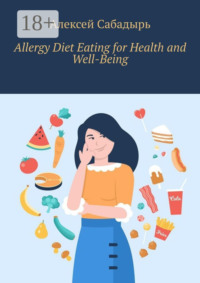Kitabı oku: «Allergy Diet Eating for Health and Well-Being»
A doctor's consultation is required before applying the recommendations
© Алексей Сабадырь, 2025
ISBN 978-5-0062-4550-1
Created with Ridero smart publishing system
Chapter 1: What are allergies and how do they affect nutrition?
An allergy is the body’s immunological reaction to certain substances that are usually harmless to most people. These substances, known as allergens, can be found in a variety of foods such as milk, eggs, nuts, fish, shellfish, wheat, soy, fruits, vegetables and others. When exposed to an allergen, the immune system may react, causing various symptoms such as itching, skin rashes, swelling, breathing problems or gastrointestinal problems.
For people with allergies, nutrition can be challenging because you need to carefully monitor your intake of certain foods to avoid unwanted reactions. This also means that when planning a diet, allergy sufferers should pay special attention to the choice of foods, as well as the methods of preparing them, to avoid allergic reactions and ensure that they eat a nutritious and healthy diet.
Chapter 2: Basic principles of a diet for allergy sufferers
When it comes to what people eat, there are usually a few basic principles that nutritionists recommend for allergy sufferers. Here are some of them:
Avoid known allergens. This includes foods such as nuts, milk, eggs, wheat, soy products, seafood, artificial additives and preservatives.
Maintain balance. The optimal ratio of macronutrients (proteins, fats, carbohydrates) is important for the health of allergy sufferers. They should eat enough protein, carbohydrates and fat to maintain health and energy.
Stick to natural and fresh foods. This is important because they often contain fewer chemical additives and preservatives that can cause an allergic reaction.
Limit your consumption of processed foods. They may contain hidden allergens and may also be high in sugar, salt and saturated fat.
Consider individual needs. Although there are general guidelines, it is important to consider the individual needs of each allergy sufferer. Some may be allergic to certain foods that are acceptable to others.
Watch your reactions. If you suspect you are allergic to a certain food, monitor how your body reacts to it. It is recommended to keep a food diary and consult a doctor for more information.
Following these basic dietary principles will help allergy sufferers stay healthy and well.
Chapter 3: Allergens in Food: What You Need to Know
Allergens in food are substances that can cause allergic reactions in some people. These reactions can be mild, such as itching or minor swelling, or they can be more severe, including anaphylactic shock, which can be fatal. Therefore, it is important to know which foods may contain allergens and how to avoid them if you or someone you love has allergies.
There are eight main allergens that must be listed on food labels under food safety regulations. These eight allergens are gluten, milk, eggs, soy, nuts, fish, seafood and celery. However, this does not mean that other allergens cannot cause allergic reactions. For example, sometimes people may be allergic to vegetables, fruits, or other foods that are not on this list of eight allergens.
If you or your child has allergies, it is important to be careful about reading food labels. Manufacturers are required to disclose the presence of any allergens in a product, so always try to read the label before purchasing or consuming a product.
It is especially important to avoid cross-contamination, which is when allergen-free foods may become contaminated with traces of those allergens due to improper handling or storage. For example, if frying oil is used to fry fish and then fry potato wedges with it, it may cause an allergic reaction in a person allergic to fish.
Ücretsiz ön izlemeyi tamamladınız.
